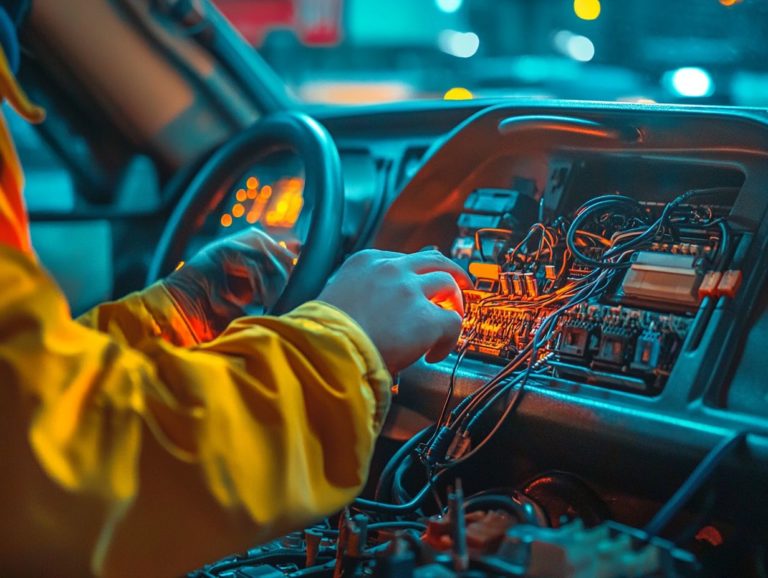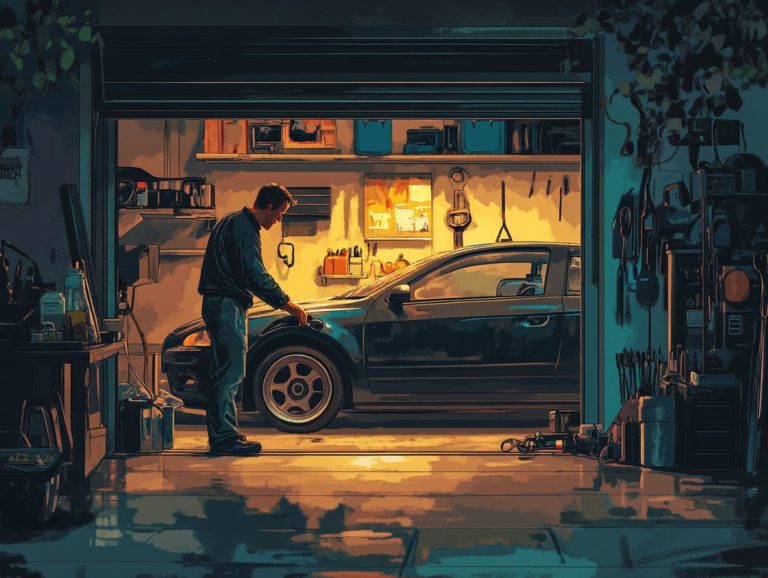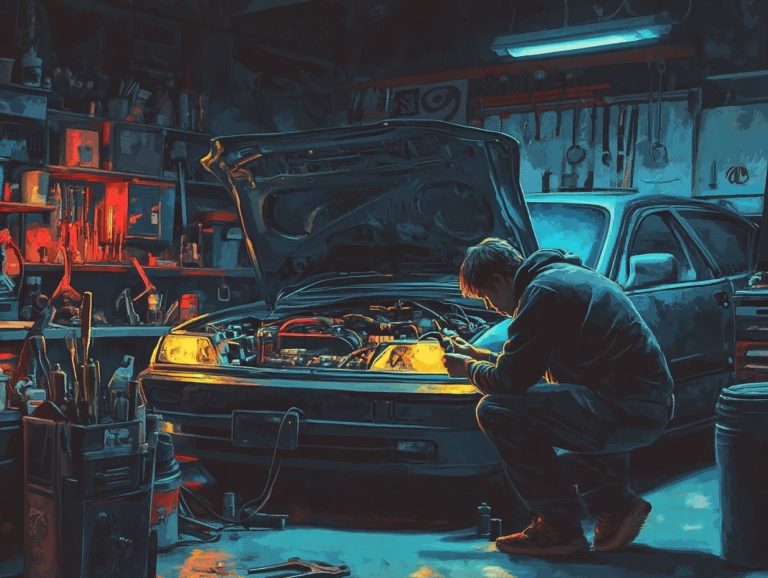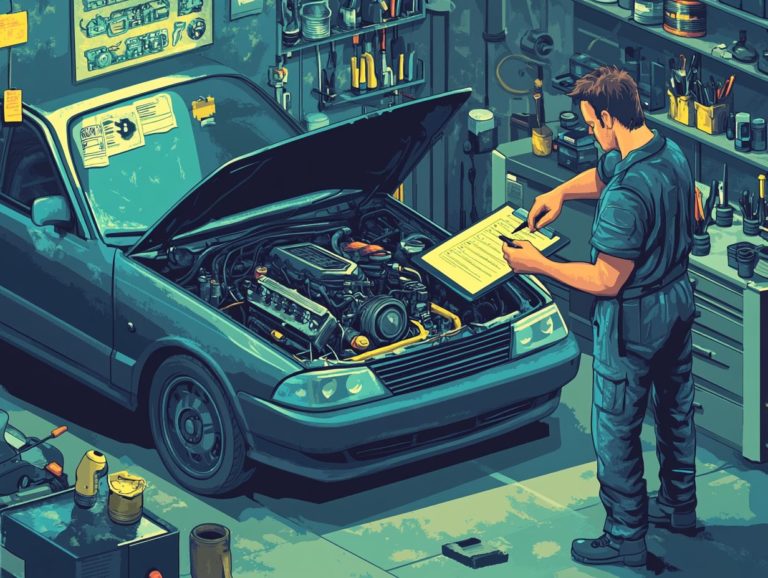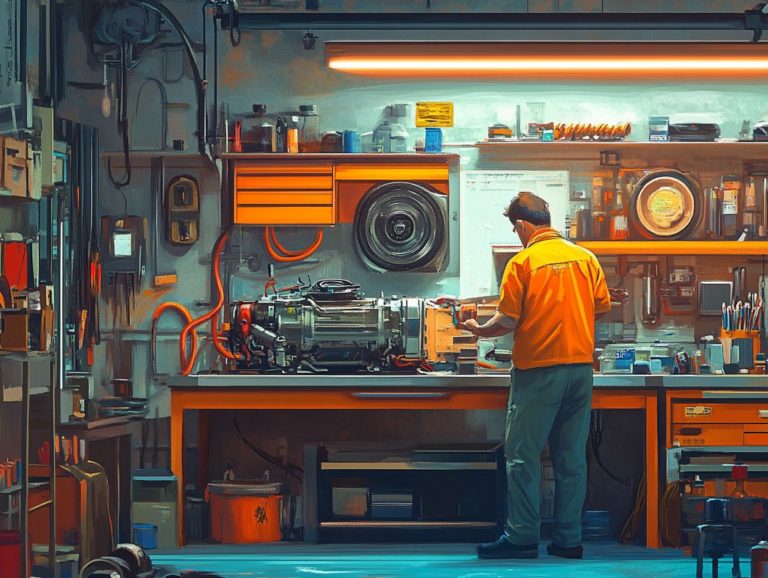5 Common Radiator Issues and Fixes
Radiators play a vital role in ensuring your home remains warm and inviting, yet they can occasionally introduce disruptions to your comfort.
From pesky leaks and unsettling noises to inconsistent heating, grasping these common radiator problems is essential for maintaining a cozy atmosphere.
This guide delves into five prevalent radiator issues, outlining their potential causes and effective solutions. Whether you’re tackling a stubborn radiator or seeking to prevent future complications, this information will empower you to keep your heating system operating at its best.
Contents
- Key Takeaways:
- 1. Leaking Radiator
- 2. No Heat Coming from the Radiator
- 3. Radiator Is Making Strange Noises
- 4. Uneven Heating in Different Rooms
- 5. Radiator Is Not Working at All
- How to Identify and Fix Common Radiator Issues
- What Are the Possible Causes of a Leaking Radiator?
- How Can One Fix a Leaking Radiator?
- What Are the Possible Causes of No Heat Coming from the Radiator?
- How Can One Fix a Radiator with No Heat?
- What Are the Possible Causes of Strange Noises from the Radiator?
- How Can One Fix a Radiator Making Strange Noises?
- What Are the Possible Causes of Uneven Heating in Different Rooms?
- How Can One Fix Uneven Heating from the Radiator?
- What Are the Possible Causes of a Radiator Not Working at All?
- How Can One Fix a Radiator That Is Not Working?
- How Can One Prevent Future Radiator Issues?
- Frequently Asked Questions
- What are the 5 common radiator issues?
- What causes radiator leaks and how can they be fixed?
- How can a radiator blockage be identified and resolved?
- What are the signs of rust or corrosion in a radiator and how can it be prevented?
- Why is my car overheating and how can I fix it?
- How do air pockets form in a radiator and how can they be removed?
Key Takeaways:
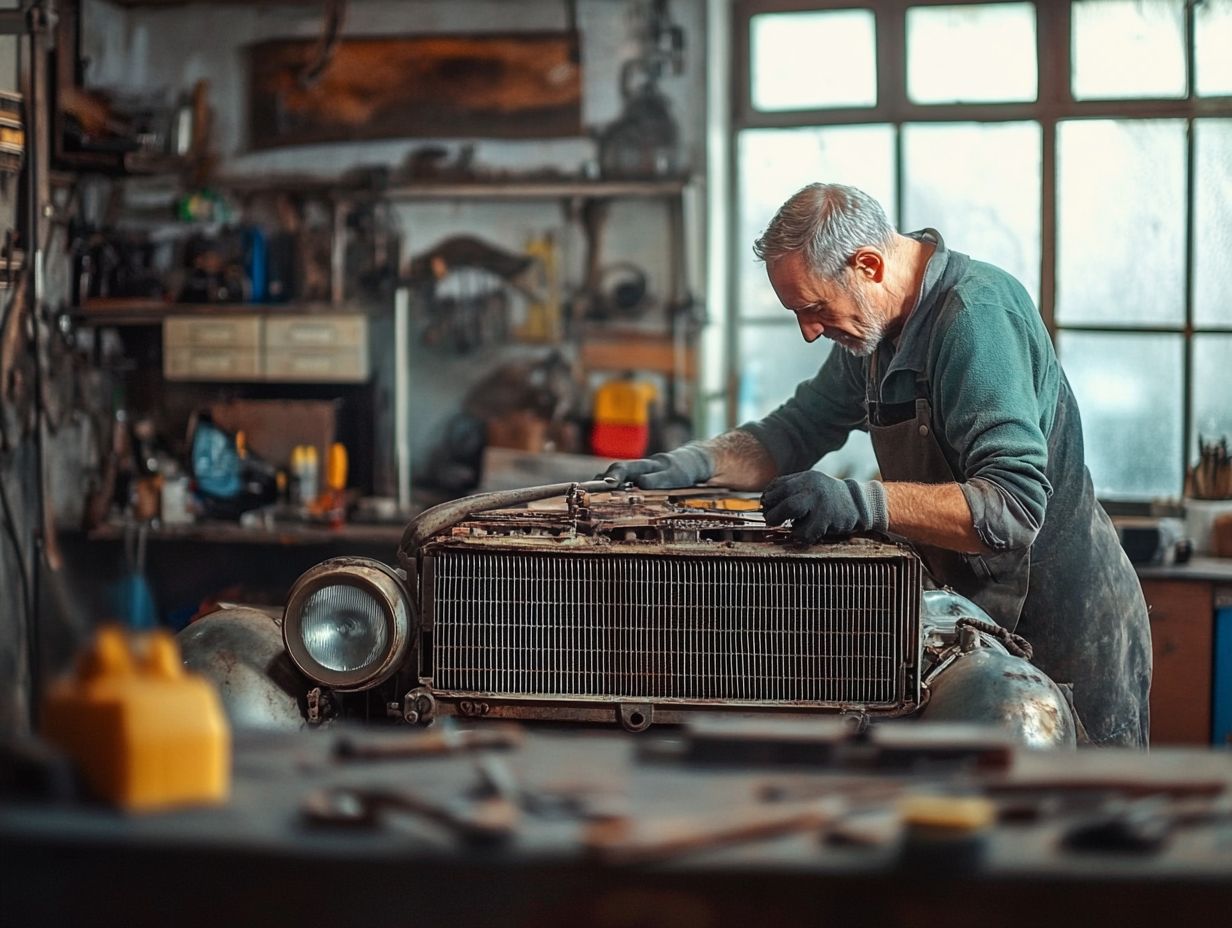
- Leaking radiators can be caused by loose valves or damaged pipes and should be fixed immediately to avoid water damage.
- Lack of heat from the radiator can be due to air pockets or blockages in the system, which can be resolved by bleeding or flushing the radiator.
- Strange noises from the radiator may be a result of air trapped in the system or a loose valve, and can be fixed by bleeding or tightening the valve.
1. Leaking Radiator
A leaking radiator can lead to a cascade of issues within your vehicle s cooling system, jeopardizing engine performance and possibly causing overheating.
This overheating can inflict damage on crucial components like the engine block and water pump, making it vital to address the problem promptly, whether through repair or replacement.
You might notice signs of radiator trouble, such as visible coolant leaks beneath your vehicle or an unusually low coolant level, indicating a potential leak somewhere in the system.
Common culprits include rusty radiator components that have weakened over time, rendering them more prone to leaks. Don t wait! Have your cooling system inspected regularly by a qualified mechanic who can catch these issues early on.
Understanding the repair costs linked to radiator problems can better equip you to budget effectively and make informed decisions about necessary maintenance.
Timely inspections not only save you money but also protect your engine s integrity in the long run.
2. No Heat Coming from the Radiator
When your radiator isn t producing heat, it usually points to issues with coolant circulation perhaps a malfunctioning thermostat, which is the device that controls the temperature, or air trapped in the cooling system. This can significantly affect your vehicle’s comfort and efficiency.
To tackle this, begin by checking the thermostat settings to ensure they align with your vehicle s requirements, as an improperly set thermostat can keep the radiator from reaching the necessary temperatures.
Check for air pockets in the cooling system, as they can impede coolant flow and hinder heating. By maintaining optimal coolant levels, you can ensure efficient heat production and help prevent overheating.
Regular automotive maintenance, like flushing the cooling system and checking for leaks, boosts radiator performance and extends your vehicle’s lifespan, minimizing potential heating issues over time.
3. Radiator Is Making Strange Noises
Strange noises from your radiator might be trying to tell you something important like there’s debris buildup disrupting coolant circulation or a problem with the radiator fan. If you ignore these signals, you could face pressure imbalances and overheating.
Pay attention to any hissing, bubbling, or rattling sounds; they can reveal valuable insights into your radiator’s health. A hissing noise may indicate steam escaping due to a coolant leak, while bubbling often suggests air trapped in the system, possibly from low coolant levels or a malfunctioning water pump.
Rattling could mean the radiator fan is loose or damaged, which hampers proper cooling. These noises aren’t just annoying; they often indicate that both the fan and the coolant system need your immediate attention.
Regular inspections can help ensure that your radiator operates efficiently, extending its lifespan and saving you from costly repairs in the future.
4. Uneven Heating in Different Rooms
If you notice uneven heating in different rooms, it may indicate problems with your radiator system. Common issues include a broken temperature control, blocked radiator hoses, or trapped air. These factors can seriously affect heat distribution and your overall comfort.
To find the root causes, start by checking for trapped air. Bleeding the radiators often fixes these issues and helps heat circulate evenly. Then, inspect the radiator hoses for blockages or leaks, as these can restrict hot water flow.
Regular maintenance is key. By scheduling routine radiator inspections, you can catch potential issues early and keep your system running efficiently. This ensures consistent warmth throughout your home and can save you money on energy costs.
5. Radiator Is Not Working at All
If your radiator isn t working, you risk serious engine damage due to overheating. This shows how crucial it is to regularly check your radiator and address any early signs of failure to maintain optimal engine performance.
Complete radiator failure can occur due to internal leaks that allow coolant to escape or clogged components that block circulation. Both issues can significantly affect your engine’s ability to stay cool.
To prolong your radiator’s life, check for leaks, ensure the coolant is at the correct level, and clean out any debris. Neglecting these simple tasks can lead to high repair costs; a minor issue can quickly escalate into an expensive replacement.
Taking action now not only saves you money but also ensures your vehicle runs smoothly so you can enjoy peace of mind on the road.
How to Identify and Fix Common Radiator Issues
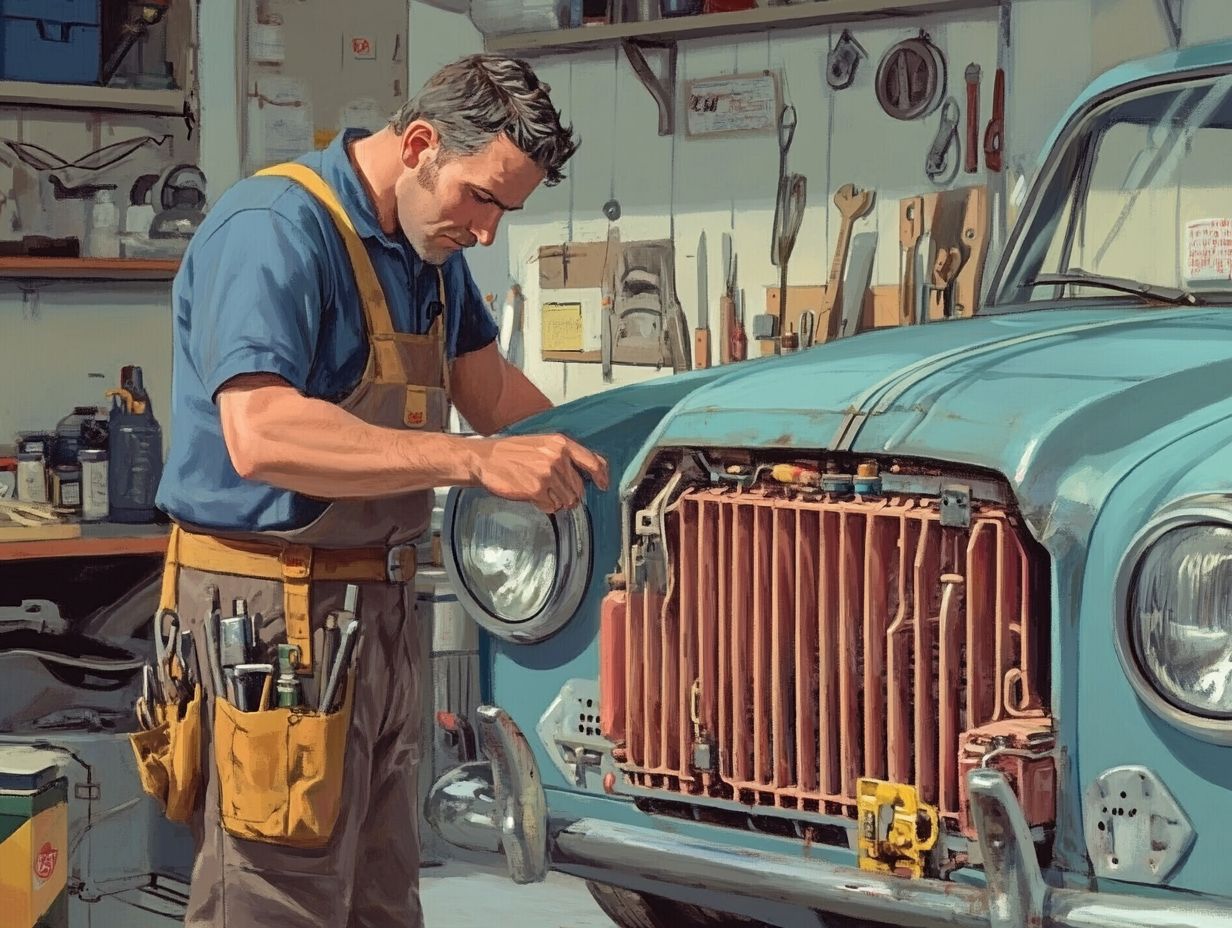
Identifying and fixing common radiator issues is essential for a healthy cooling system. Regularly check for leaks, assess the coolant s color, and evaluate the condition of various radiator components to avoid costly repairs later.
Knowing when to schedule coolant changes is vital for prolonging your radiator’s lifespan. Monitor the coolant s condition murky or rusty fluid indicates potential problems.
While mechanics can conduct thorough inspections, it s equally important for you to take a proactive stance. Simple preventive measures, like keeping the radiator grille clear of debris and checking that the hoses are in good condition, can enhance efficiency.
Consistent maintenance not only improves performance but also helps you avoid unexpected breakdowns, allowing you to enjoy your time on the road.
What Are the Possible Causes of a Leaking Radiator?
- Rust and corrosion
- Pressure buildup from overheating
- Internal leaks
Leaking radiators can result from various issues, including rust and corrosion that compromise the structural integrity of the radiator. These problems hinder its ability to dissipate heat effectively. Rust creates tiny holes that allow coolant to escape, leading to low fluid levels and increasing the risk of engine overheating.
To catch leaks early, regular inspections are crucial. Look for moisture or discoloration around radiator fittings. Implement preventive measures, like flushing the cooling system and using rust-inhibitor additives, to significantly enhance radiator lifespan and performance, ensuring your vehicle runs smoothly for years.
How Can One Fix a Leaking Radiator?
Fixing a leaking radiator involves a methodical approach. First, identify the source of the leak.
Next, perform a coolant flush to clean out the engine’s coolant and eliminate any gunk buildup that may worsen the issue.
Depending on what you find, scheduling a mechanic’s inspection might be essential to accurately assess repair costs.
As you navigate this process, inspect hoses and clamps for signs of deterioration; these components often cause leaks.
For a quick, temporary fix, applying a sealant can effectively stop the leak until you can address the issue more permanently.
Long-term solutions may require you to replace the entire radiator or repair specific sections based on the leak’s severity.
While minor repairs can sometimes be managed at home, enlisting professional help is invaluable for more complex issues, ensuring both safety and reliability.
Finally, get multiple estimates quickly to avoid unexpected costs.
What Are the Possible Causes of No Heat Coming from the Radiator?
The lack of heat from your radiator can stem from several factors, including blocked coolant circulation, a faulty thermostat, or trapped air within the system.
These issues can impede effective heating and disrupt your comfort.
Understanding how these elements interact can significantly aid in troubleshooting. For instance, if coolant circulation is blocked, it might be due to debris in the radiator or damaged hoses.
Start by inspecting for visible leaks or kinks in the piping. Consider flushing the radiator to eliminate any blockages.
If the thermostat isn’t functioning correctly, it may be stuck either open or closed, leading to inconsistent heating. Check its positioning or replace it to resolve the issue.
To release trapped air, bleed the radiator valves so hot water can flow freely and restore comfort.
How Can One Fix a Radiator with No Heat?
To fix a radiator that’s not producing heat, start by checking the coolant level and ensuring there are no pesky air pockets.
Next, inspect the thermostat and verify that coolant circulation is functioning properly.
Once you’ve covered those basics, check the radiator itself for any visible leaks or blockages hindering performance.
Ensure that the radiator valves are fully open; restricted flow often leads to inefficiencies and reduced heat output.
If you don t find any issues there, investigate the condition of the heating system’s pump. A malfunctioning pump can disrupt circulation.
If the problem persists despite your best efforts, seeking professional help may be necessary. They can diagnose deeper mechanical faults or handle complex repairs, ensuring your heating system operates safely and efficiently.
What Are the Possible Causes of Strange Noises from the Radiator?
Strange noises from your radiator could indicate gunk buildup affecting coolant circulation, issues with the radiator fan, or pressure irregularities within the cooling system.
These sounds can range from hissing and bubbling to clanking or whirring, each offering clues about potential issues.
A hissing noise might indicate steam escaping due to overheating, while a clanking sound could suggest loose components or debris lurking within the system.
To address these issues, start by visually inspecting the radiator for leaks, checking coolant levels, and listening closely to pinpoint specific noise patterns.
Regular maintenance like flushing the coolant system, tightening any loose parts, and swapping out aging hoses can help you avoid these annoying sounds and keep your vehicle running smoothly.
How Can One Fix a Radiator Making Strange Noises?
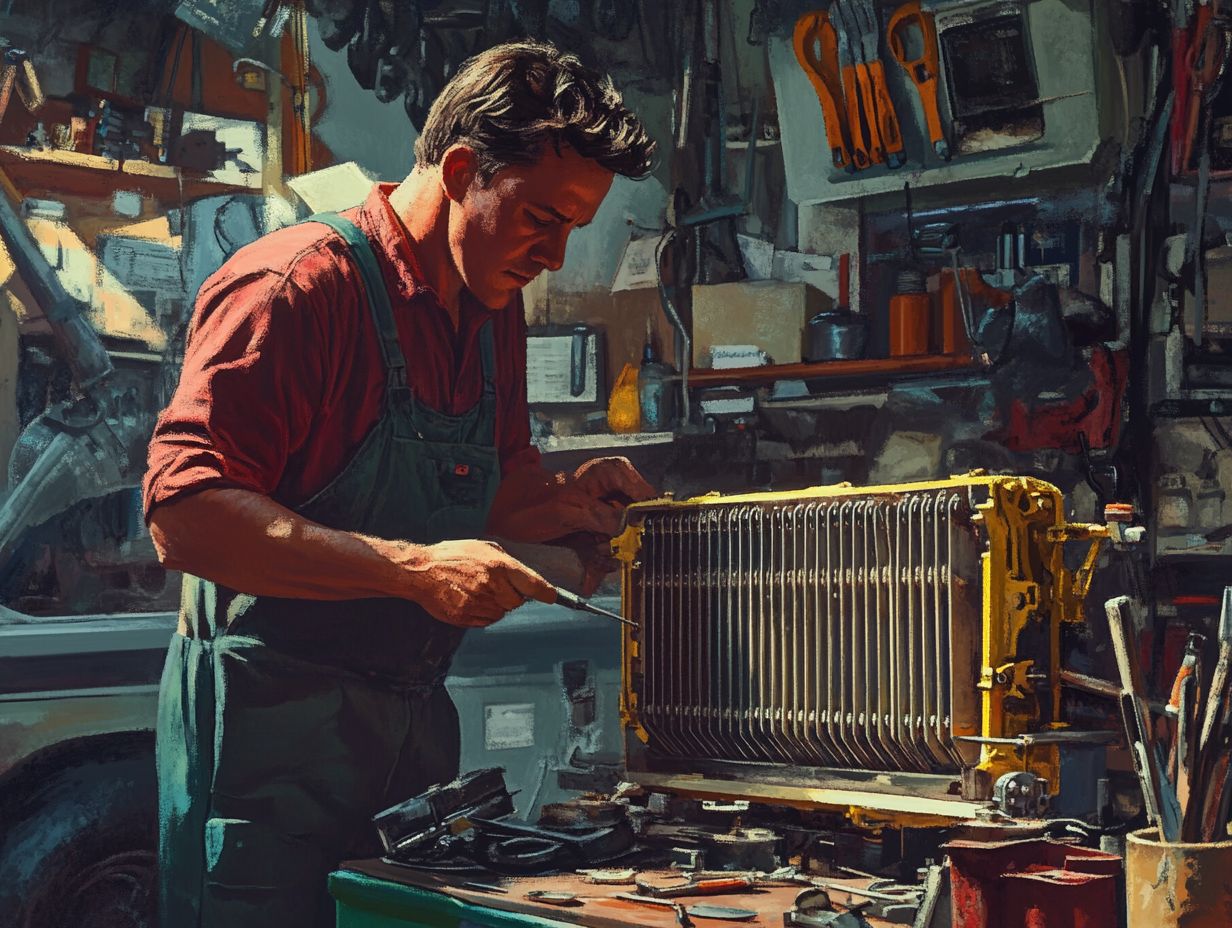
To fix a noisy radiator, start with a complete inspection of the radiator fan and the coolant system. Remove any buildup and check that all components are working properly.
Look for blockages like leaves or debris that could block airflow in the grill or fan area. After clearing visible blockages, clean any dust or grime on the radiator fins and hoses. Even small amounts can affect performance.
If the noises continue, check the coolant level and look for leaks in the system. If these steps don t help, consult a mechanic for a thorough inspection and repairs.
What Are the Possible Causes of Uneven Heating in Different Rooms?
Uneven heating can arise from various issues. Common causes include a faulty thermostat, trapped air, or blockages hindering heat dissipation.
Start by checking your thermostat settings to ensure they are correctly calibrated. Air trapped in the radiator or heating ducts can disrupt hot air flow, which you can fix by bleeding your radiators or checking for leaks in your ductwork.
Blockages from furniture or drapes can also restrict airflow. Keep pathways clear for warm air to circulate effectively.
Regular maintenance checks are essential. They help you identify and address issues, ensuring your home stays comfortably heated.
How Can One Fix Uneven Heating from the Radiator?
To fix uneven heating, start by checking the thermostat. Remove trapped air from the system and ensure all components are clear for effective heat distribution.
Next, verify that the radiator valves are fully open. Closed valves can restrict hot water flow, leaving cold spots. Use a radiator key to bleed any remaining air pockets.
After adjusting the valves, observe the heat distribution. Some radiators may need a thorough cleaning to remove dust and debris that block heat transfer.
If problems persist, use tools like a thermal imaging camera to find cold spots. You may also want to consult a heating professional for deeper issues.
What Are the Possible Causes of a Radiator Not Working at All?
A radiator that isn’t working can be due to several issues. Common problems include internal leaks, clogged components, or severe radiator failure.
Other factors like a faulty thermostat or low coolant levels can also reduce radiator efficiency. Inspect the radiator s condition, looking for signs of wear or obstructions in the hoses.
Regular inspections are key for preventive maintenance. This helps you catch potential problems before they become serious issues.
Keeping your cooling system in optimal shape can save you from costly repairs and ensure safer driving conditions.
How Can One Fix a Radiator That Is Not Working?
Is your radiator giving you trouble? Let s get it fixed! To address a malfunctioning radiator, your first step is to pinpoint the cause of the issue. This may involve inspecting the coolant system, performing a coolant flush (cleaning out the system to remove old coolant and debris), or even scheduling a trained mechanic’s inspection for a thorough evaluation.
Start by checking for leaks, ensuring the radiator cap is securely fastened, and confirming that there are no blockages in the hoses. If the problem appears to be too complex or requires specialized tools, it s certainly wise to consider seeking professional assistance.
Many vehicle owners might feel inclined to tackle minor issues themselves, as it saves money and fosters a rewarding sense of accomplishment. However, if major components are at play or if the problem persists despite your DIY efforts, turning to a trained mechanic could prove more effective.
Repair costs can vary significantly. Minor leaks may cost around $100, while more extensive repairs or a complete radiator replacement can exceed $500. It s crucial to assess the severity of the situation before diving into any fixes.
How Can One Prevent Future Radiator Issues?
Don t wait for a breakdown! Preventing future radiator issues requires your commitment to regular maintenance practices. Check the quality of your coolant, schedule timely flushes, and arrange routine inspections with a trusted mechanic. These steps will help ensure the overall health of your radiator and cooling system.
These steps can help you avoid overheating and save money on repairs. Choosing the right coolant formulation is vital; using fluids that meet your vehicle’s specific requirements will help maintain optimal temperature and prevent corrosion or scale buildup in the radiator.
Regularly checking coolant levels and quality not only enhances the efficiency of your radiator but also extends its lifespan, contributing to more reliable engine performance. Ultimately, investing time in these practices pays off, ensuring you enjoy a smoother driving experience for years to come.
Frequently Asked Questions
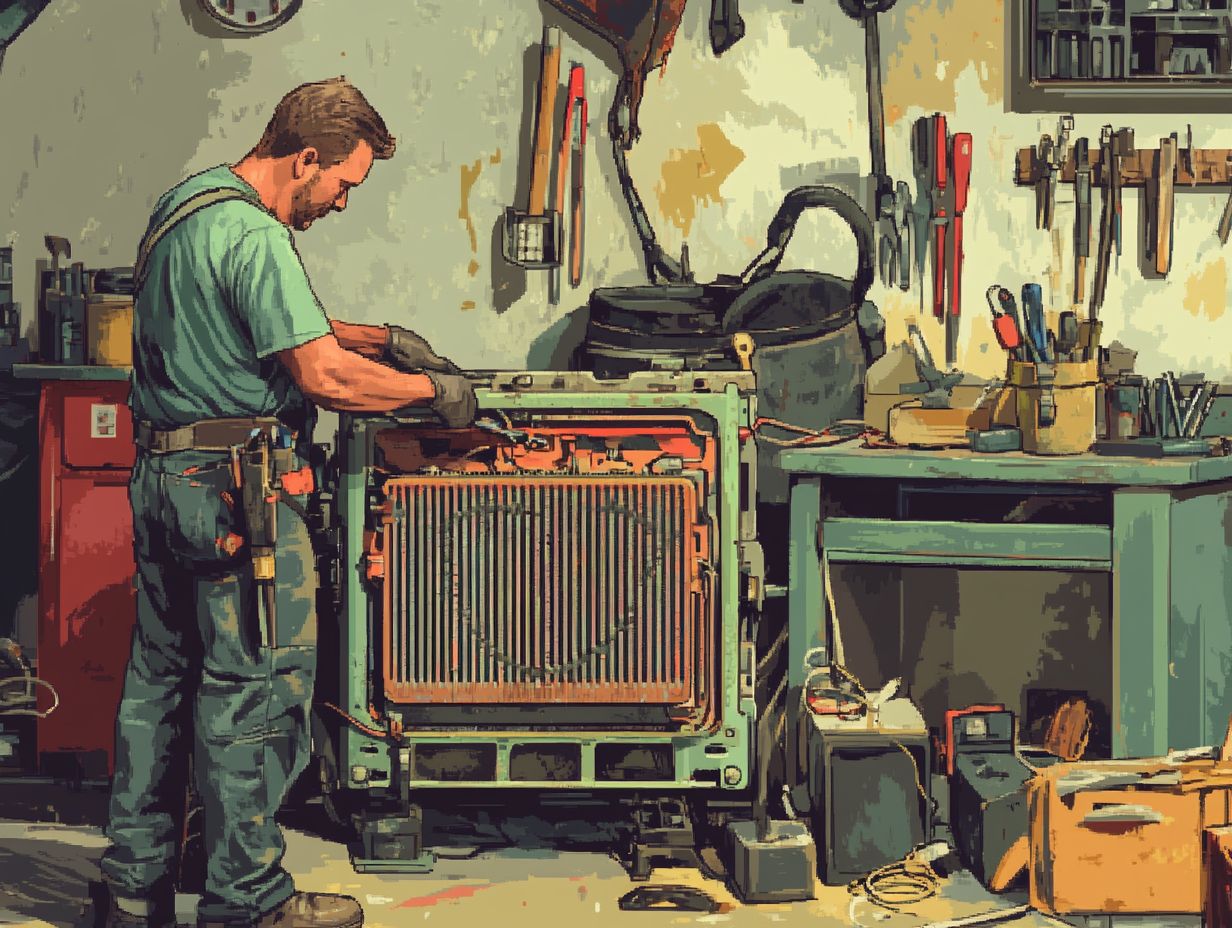
What are the 5 common radiator issues?
The 5 common radiator issues are leaks, blockages, rust/corrosion, overheating, and air pockets.
What causes radiator leaks and how can they be fixed?
Radiator leaks can be caused by various factors such as corrosion, worn-out hoses, or damage to the radiator itself. To fix a leak, you can use a radiator sealant or replace the damaged parts.
How can a radiator blockage be identified and resolved?
A radiator blockage can be identified if your car is overheating or if there is little to no hot air coming from the heater. It can be resolved by flushing the radiator or using a radiator cleaner solution.
What are the signs of rust or corrosion in a radiator and how can it be prevented?
Signs of rust or corrosion in a radiator include brown or discolored coolant, low coolant levels, and visible rust on the radiator itself. To prevent this issue, use a rust inhibitor additive and regularly flush and refill the coolant.
Why is my car overheating and how can I fix it?
An overheating car can be caused by a malfunctioning thermostat, a faulty water pump, or low coolant levels. To fix this issue, check and replace any damaged parts, top off the coolant, and flush the radiator if necessary.
How do air pockets form in a radiator and how can they be removed?
Air pockets can form in a radiator due to a lack of proper bleeding or maintenance. To remove them, you can use a radiator bleed kit or simply bleed the radiator by opening the bleed valve while the engine is running.


